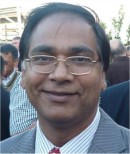
Plenary Lecture
Solar Air Conditioning for an Institutional Building in Subtropical Climate

Associate Professor Mohammad G. Rasul
School of Engineering and Built Environment
Faculty of Sciences, Engineering and Health
Central Queensland University, Queensland 4702
Australia
E-mail: m.rasul@cqu.edu.au
Abstract: Air conditioning is one of the major consumers of electrical energy. The most of the ways of generating the electricity today, as well as the refrigerants being used in traditional vapour compression cooling system, produce greenhouse gas emissions which ultimately contribute to global warming. It is therefore necessary to develop process and technology to implementing renewable sources of energy for air conditioning to reduce greenhouse gas emissions and to achieve sustainable development. The use of solar energy to drive cooling cycles for space conditioning is relatively a new and attractive concept which mostly eliminates the need for CFC, HCFC or HFC refrigerants.
In this presentation an overview of a hybrid solar desiccant cooling system which has been designed and installed in an institutional building of Central Queensland University, Rockhampton campus, Australia is presented. Solar desiccant cooling technology consists of solar system, dehumidification system and a cheap chilling system like an evaporative cooling system. The main concept of desiccant cooling system is based on the system’s capability of reducing vapours and moisture contents out of air using a physical sorption process. The conceptual bases of the technology, capability and limitations are outlined. The energy demand, energy consumption, and economic and environmental problem associated with the usage of fossil fuel resources in Australian commercial buildings and the issues of indoor air quality, mould growth and indoor thermal comfort are discussed. Furthermore, experimental and computational results of the performance of installed solar desiccant cooling system is presented and discussed. The results are analysed on the basis of energy savings, solar fraction (SF), primary energy used, coefficient of performance (COP) and desiccant system efficiency. Results showed that the installed solar desiccant cooling system at Central Queensland University can achieve 18% energy savings with maximum coefficient of performance of 0.83 and 48% desiccant efficiency.
Brief Biography of the Speaker: Associate Professor Mohammad Rasul obtained his PhD in the area of Energy, Environment and Thermodynamics from The University of Queensland, Australia. He received his Master of Engineering in Energy Technology from Asian Institute of Technology, Bangkok, Thailand. His first degree is in Mechanical Engineering. Currently, he is an Associate Professor in Mechanical Engineering of the School of Engineering and Built Environment at Central Queensland University, Australia. He is specialised and experienced in research, teaching and consultancy in the areas of thermodynamics, energy (industrial and renewable) and environment, and resource industries and sustainability. He has published more than 200 research articles/papers both in reputed journals and refereed conferences including 7 book chapters, two edited books, one awarded paper in a refereed journal and two awarded papers at conferences in the area of energy and thermodynamics. He has supervised more than a dozen of research higher degree (RHD) students (PhD and Masters) and currently supervising twelve. In the last five years he has secured more than $2.4 million research grant. His research has made significant impact to national and international scientific communities through a large number of citations and h-index. He has also made significant contributions in engineering education research and scholarships in the area of project based learning and innovative teaching practices. He has edited two books, one on Developments in Engineering Education Standards: Advanced Curriculum Innovations and another on Thermal Power Plants. Currently he is editing Advanced Applications of Thermal Power Plants. His contributions to the professional community have been demonstrated through his varied roles and activities, such as membership of national and international technical, scientific and advisory committees, membership of different professional organizations and various organizing committees. He has been leading and contributing to the strategic research on Resource Industries and Sustainability in Energy and Environment.